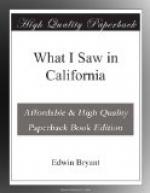Our stock of cattle being exhausted, we feasted on Californian mutton, sheep being more abundant than cattle at this mission. The wool, I noticed, was coarse, but the mutton was of an excellent quality. The country over which we have travelled to-day shows the marks of long drought previous to the recent rains. The soil is sandy and gravelly, and the dead vegetation upon it is thin and stunted. About eighty of our horses are reported to have given out and been left behind. Distance 20 miles.
December 12.—To relieve our horses, which are constantly giving out from exhaustion, the grass being insufficient for their sustenance while performing labour, the entire battalion, officers and men, were ordered to march on foot, turning their horses, with the saddles and bridles upon them, into the general caballada, to be driven along by the horse-guard. The day has been drizzly, cold, and disagreeable. The country has a barren and naked appearance; but this, I believe, is attributable to the extreme drought that has prevailed in this region for one or two years past. We encamped near the rancho of a friendly Californian—the man who was taken prisoner the other day and set at large. An Indian, said to be the servant of Tortoria Pico, was captured here by the advance party. A letter was found upon him, but the contents of which I never learned. This being the first foot-march, there were, of course, many galled and blistered feet in the battalion. My servant obtained, with some difficulty, from the Indians at the rancho, a pint-cup of pinole, or parched corn-meal, and a quart or two of wheat, which, being boiled, furnished some variety in our viands at supper, fresh beef having been our only subsistence since the commencement of the march from San Juan. Distance 12 miles.
December 13.—A rainy disagreeable morning. Mr. Stanley, one of the volunteers, and one of the gentlemen who so kindly supplied us with provisions on Mary’s River, died last night. He has been suffering from an attack of typhoid fever since the commencement of our march, and unable most of the time to sit upon his horse. He was buried this morning in a small circular opening in the timber near our camp. The battalion was formed in a hollow square surrounding the grave which had been excavated for the final resting-place of our deceased friend and comrade. There was neither bier, nor coffin, nor pall—
“Not a drum was heard, nor a funeral note.”
The cold earth was heaped upon his mortal remains in silent solemnity, and the ashes of a braver or a better man will never repose in the lonely hills of California.




